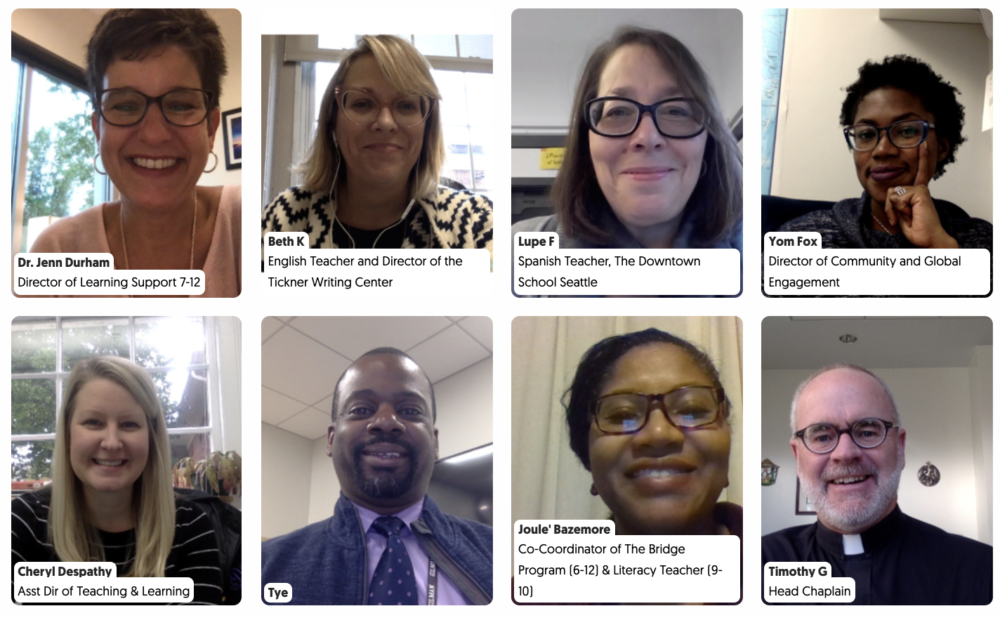15 Resources for Rethinking Assessment

GOA just wrapped our one week course titled Rethinking Assessment, featuring 200 participants from 60 schools/learning organizations across 8 countries.
Rethinking Assessment is part of our Rethinking School series of five courses designed to spark conversation, create opportunities for teachers to learn with peers at other schools, and catalyze change in our learning institutions. In this course, educators zoomed in on different assessment models and collaborated with other participants on improving existing strategies for assessment.
Specifically, Rethinking Assessment encouraged teachers to think about different types of assessments that promote durable and transferable learning. We tackled big questions about how assessments can drive learning, and the role that both formative and summative assessments play in the learning process. We also dove more deeply into the role of feedback and how certain types of feedback is a significant lever for optimizing student learning.
The course also featured interviews with guest experts Jay McTighe and Kevin Mattingly, who set the foundational understanding on the state of assessment in schools today and the potential of assessment practices for the future.
We asked participants to help curate a set of recommended resources on assessment for all of you. Thank you to all participants who contributed to our learning and to our growth. Here are some resources that they shared:
15 Resources for Rethinking Assessment
10 Assessments You Can Perform In 90 Seconds (resources)
"Good assessment is frequent assessment. Assessments are designed to provide a snapshot of student understanding—the more snapshots, the more complete the full picture of knowledge."
75 Digital Tools and Apps Teachers Can Use to Support Formative Assessment in the Classroom (resources)
The criteria for tools added to this NWEA list include: "support formative instructional strategies and ways to activate learners to be resources for themselves and peers, free or awful close to it (under $10 per year, where possible), and ideally both students and teachers can take the activator role in using them; however, sometimes teachers may need to get things started."
Austin’s Butterfly (video)
Ron Berger from EL Education demonstrating the power of actionable feedback and drafting with a drawing from a first grader.
Authentic Assessment Toolbox (resources)
A toolbox with varied resources on creating authentic tasks, rubrics, and standards for measuring and improving student learning.
Differentiated Instruction: A Guide for World Language Teachers (book) by Deborah Blaz
A book on differentiated instruction for language classes that also has ways to implement alternative assessments so that we are meeting the students’ needs.
Do No-Zero Policies Help or Hurt Students? (article) by Beth Brodie
This article is from Edutopia and discusses why the 0 can be inequitable and in no way an accurate assessment of knowledge. Highlight: No grading policy can give as adequate feedback as actual feedback.
Grading for Equity (book) by Joe Feldman
Interesting look at how methods of deriving grades can be adjusted for greater equity at schools.
Highlighting Mistakes (video)
A video on highlighting mistakes, an example of a grading strategy in which students have to figure out what was the mistake made before they get their grades back.
Human Restoration Project by Nick Covington and Chris McNutt
A non-profit that aims to aid teachers in treating students as human beings and not statistics on standardized tests. They have a handy resources page with some thought-provoking articles and tip sheets on grades, assessment and feedback.
On Your Mark, Challenging the Conventions of Grading and Reporting (book) by Thomas Gusky
A book to help educators “create and sustain a learning environment where students thrive and stakeholders are accurately informed of student progress.”
Resources for Practical and Compelling Educational Change (resources)
Grading strategies for standards-based grading, ideas for re-assessment, differentiation, etc.
The Facilitator’s Book of Questions: Tools for Looking Together at Student and Teacher Work (book) by David Allen
This book includes a series of protocols that can be used in teacher teams to examine student and teacher work. The book is particularly helpful for professional learning communities.
The Having of Wonderful Ideas and Other Essays (book) by Eleanor Duckworth
This collection of essays has helped frame my own understanding of my classroom as a place where students can and should discover, be creative, and have ideas.
Why Teach? In Defense of a Real Education (book) by David Chamberlain
A collection of essays that makes the case that the primary purpose of education is to destabilize one’s own views and to learn how to think critically.
Why We Need More Testing, Not Less (article)
In this article, Nick Soderstrom begins with an "undeniable empirical reality" discovered through cognitive psychology: that testing leads to better learning. He continues by offering research and strategies to use assessments as learning tools.
We urge you to engage in conversations with your colleagues on rethinking assessment in departmental, divisional, and full faculty meetings. Reach out to educators at your school or other schools to learn more about how they’re rethinking assessment. Share out your findings on Twitter using #rethinkingschool.
GOA is offering additional courses as part of its Rethinking School series. Check out all of our upcoming educator courses. And, subscribe to our newsletter below for updates on new course offerings and dates.
